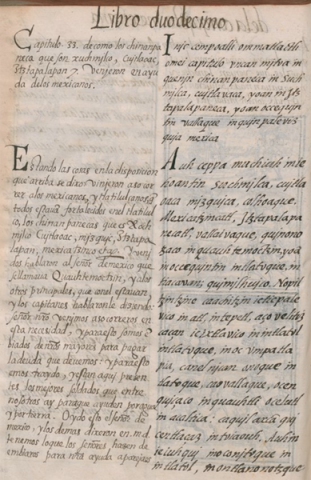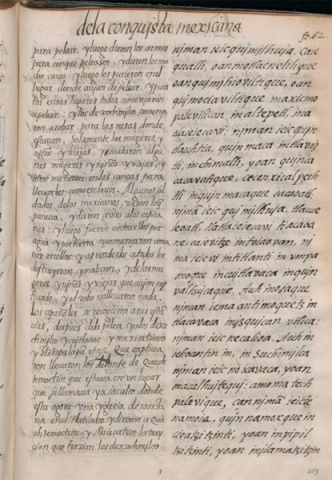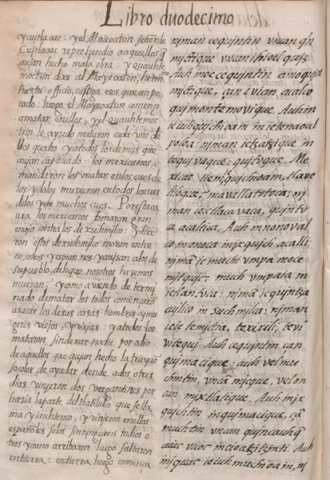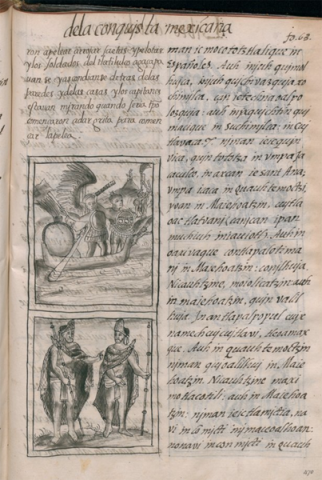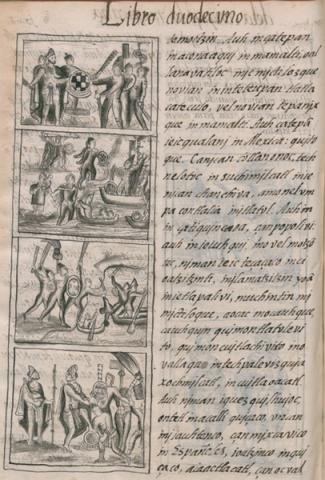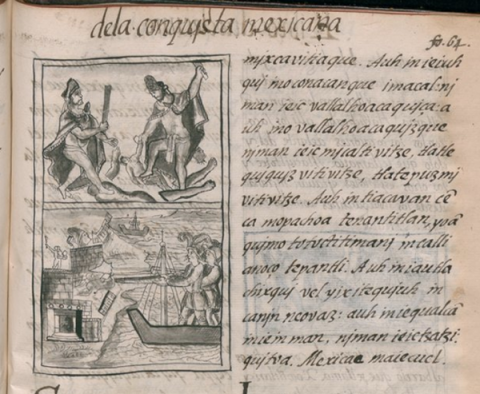 |
[Transcription of the Nahuatl (right-hand column) by James Lockhart:]
[f. 61v] Inic cempoalli ommatlactli omei capitulo vncan mitoa in quenin chinanpaneca in Suchmilca, cuitlavaca, yoan in Itztapalapaneca, yoan oc cequintin vallaque in quinpalevizquia mexica
Auh ceppa muchiuh in iehoantin suchmilca, cuitlaoaca mizquica, colhoaque, Mexicatzincatl, Itztapalapanecatl, vallaivaque, quinonotzaco in quauhtemoctzin, yoā in oc cequintin in tlatoque, in tiacavan: quimilhuico. Nopiltzintzine ca achitzin ic ticpalevico in atl, in tepetl, aço velitiz ca çan ic ixtlavico in intlatol in tlatoque, in oc vmpa tlapia, canel nican onoque in tlatoque,* ca ovallaque, ocenquiçaco in quauhtli ocelutl in acaltica: ca quil axcā quicentlaçaz in toiaouh.
Auh in ie iuhqui in oconitoque in intlatol, in ontlanonotzque
----------
*IN TLATOQUE. Several parts of the preceding passage can be interpreted in different ways. I have let myself be guided to an extent by the Spanish version.
|
[Translation of the Nahuatl (right-hand column) by James Lockhart:]
Thirty-third chapter, where it is said how the chinampa people, those of Xochimilco, Cuitlahuac, Itztapalapan, and others, came as though to help the Mexica.
Once it happened that the people of Xochimilco, Cuitlahuac, Mizquic, Colhuacan, Mexicatzinco, and Itztapalapan sent messengers who came to talk with Quauhtemoctzin and other warrior rulers, saying to them, “My lords, we have come to give a little help to the altepetl. Perhaps in this way the words of the rulers who are still in charge there will come true, for the rulers [i.e, other prominent people] are here, the eagle and jaguar [brave] warriors have come assembled in boats. It is said that now they will repel all our enemies.”
And when [the messengers] had had their say and [the Mexica] had consulted,
[Translation of the Spanish (left-hand column) by James Lockhart:]
Chapter Thirty-three, of how the Chinampaneca, who are from Xochimilco, Cuitlahuac, and Itztapalapan, etc., came in succor of the Mexica.
With things in the state told above, the Chinampaneca, who include Xochimilco, Cuitlahuac, Mizquic, Itztapalapan, Mexicatzinco, etc., came to give aid to the Mexica and Tlatelolca, who were all fortified in Tlatelolco. On arrival they spoke to the lord of Mexico, called Quauhtemoctzin, and to other leaders who were with him. The captains addressed him, saying, "Our lord, we have come to aid you in this time of necessity, and we have been sent for this purpose by our elders to pay the debt we owe. For this purpose we have brought the best soldiers we have among us, who are present here, to help on water and on land."
Hearing this, the lord of Mexico and the others said, "We appreciate what the lords are doing in sending you in our succor. Prepare yourselves
|
[Translation of the Nahuatl into Spanish by Fr. Bernardino de Sahagún; transcription of the Spanish (left-hand column) by James Lockhart:]
[f. 61v.] Capitulo .33. de como los chilnanpaneca que son xuchmilco, cuitlaoac, Itztapalapan &. venieron en ayuda de los mexicanos.
Estando las cosas en la disposicion que arriba se dixo: vinieron a socorrer a los mexicanos, y tlatilulcanos, q̄ todos estauā fortalecidos en el tlatilulco, los chinanpanecas que es Xochmilco Cuitlaoac, mizquic, Itztapalapan, mexicatzinco e̲t̲a̲. Y venidos hablaron al señor de mexico que se llamaua Quauhtemoctzin, y a los otros principales, que con el estauan, y los capitanes hablaronle diziendo: señor n̄r̄o venimos a socorreros en esta necesidad, y para esto somos ēbiados de n̄r̄os mayores para pagar la deuda que deuemos: y para esto emos traydo, y estan aqui presentes los mejores soldados que entre nosotros ay para que ayuden por agua y por tierra.
Oydo esto el señor de mexico, y los demas dixeron en .m.d. tenemos lo que los señores hazen de embiaros para n̄r̄a ayuda aparejaos
|
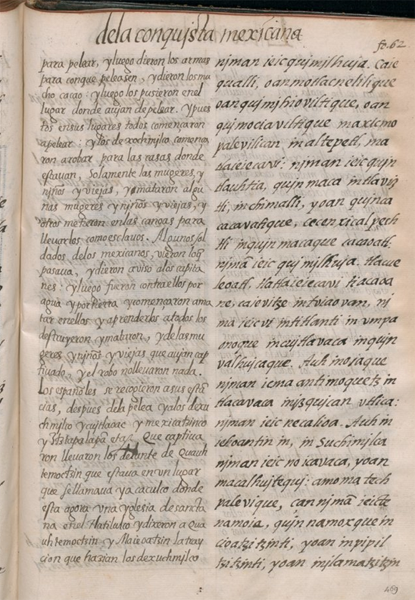 |
[Transcription of the Nahuatl (right-hand column) by James Lockhart:]
[f. 62r.] niman ie ic quimilhuia. Ca ie qualli, oanmotlacnelilique oanquimihioviltique, oanquimociaviltique ma xicmopalevilican in altepetl, ma tlaieie cavi:*
niman ie ic quintlauhtia, quinmaca in tlaviztli, in chimalli, yoan quincacacavatique, cecenxicalpechtli in quinmacaque cacaoatl: nimā ie ic quimilhuia. tlacueleoatl, tla tlaieiecavi tiacaoane, ca ie vitze in toiaovan, nima ie ic vi in titlanti in vmpa onoque in cuitlavaca in quinvalhuicacque. Auh in oiaque niman ic maantimoquetz in tlacavaca in izquican vtlica: niman ie ic necalioa.
Auh in iehoantin in, in Suchimilca niman ie ic no icavaca, yoan macalhuitequi: amo ma techpalevique, çan nimā ie ic tenamoia, quinnamoxque in cioatzitzinti, yoan in pipiltzitzinti, yoan in ilamatzitzin
----------
*MA TLAIEIECAVI. Or "let the fighting begin," and the same just below.
|
[Translation of the Nahuatl (right-hand column) by James Lockhart:]
they said to them, “Very well, we thank you. You are doubly welcome here. Do help the altepetl, let an attempt be made.”
Then they made them presents, giving them devices and shields, and they gave them cacao, giving a broad gourd of cacao to each. Then they said to them, “Come on, let the attempt be made, oh warriors, for our enemies are coming!” Then the messengers went where the Cuitlahuac people were whom they had brought. And when they went, the clamor grew everywhere on the road. Then there was fighting.
But these Xochimilco people, though then they too set up a clamor and hurled themselves in their boats, did not help us at all, but started snatching people. They snatched the women and little children and also the old women;
[Translation of the Spanish (left-hand column) by James Lockhart:]
to fight."
Then they gave them weapons to fight with, and they gave them much cacao, and then they put them in the place in which they were to do battle. Once in their places, they all began to fight.
But the Xochimilca began to rob around the houses, where there were only women and children, and old women. They killed some of the women and children and old women and put others in the canoes to carry off as slaves.
Some Mexica soldiers saw what was going on and advised the captains. Then they went against them by water and by land and began to kill some of them and take captives. They destroyed and killed them all, and of the women and children and old women they had captured, and the plunder, they got away with nothing.
After the battle the Spaniards retired to their quarters.
[The Mexica] took the Xochimilca, Cuitlahuaca, Mexicatzinca, people of Itztapalapan, etc., whom they had captured before Quauhtemoctzin, who was in a place called Yacacolco, in Tlatelolco, where now there is a church of Santa Ana. They told Quauhtemoctzin and Mayehuatzin of the treachery performed by the Xochimilca
|
[Translation of the Nahuatl into Spanish by Fr. Bernardino de Sahagún; transcription of the Spanish (left-hand column) by James Lockhart:]
[f. 62r.] para pelear,
y luego dieronlos armas para con que peleasen, y dieronlos mucho cacao: y luego los pusieron en el lugar donde auian de pelear. Y puestos en sus lugares todos començaron a pelear:
y los de xochmilco començaron a robar para las casas donde estauan, solamente las mugeres, y niños y viejas, y mataron algunas mugeres y niños y viejas, y otros metieron en las canoas para lleuarlos como esclauos.
Algunos soldados de los mexicanos, vieron lo q̄ pasaua, y dieron aviso a los capitanes: y luego fieron contra ellos por agua y por tierra y començaron a matar en ellos y a prenderlos a todos los destruyeron y mataron, y de las mugeres y niños y viejas que auian captiuado, y el robo no lleuaron nada.
Los españoles se recogieron a sus estācias, despues de la pelea
y a los de xuchmilco y cuitlaoac y mexicatzinco y Itztapalapā e̲t̲a̲. Que captiuaron lleuaronlos delante de Quauhtemoctzin que estaua en vn lugar que se llamaua yacaculco donde esta agora vna yglesia de sanctana en el Tlatilulco y dixeron a Quauhtemoctzin y Maieoatzin la traycion que hazian los de xuchmilco
|
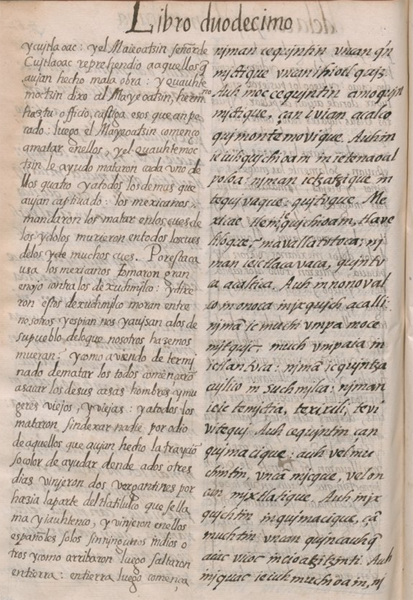 |
[Transcription of the Nahuatl (right-hand column) by James Lockhart:]
[f. 62v.] niman cequintin vncan q ’nmictique vncan ihiotl quiz. Auh in oc cequintin amo quinmictique, çan ivian acalco quimontemovique.
Auh in ie iuh quichioa in in ie tenaoalpoloa: niman ic tzatzique in tequivaque, quitoque. Mexicae tlein ie quichioa in, tlaveliloque? ma vallatotoca; niman ie ic tlacavaca, quintoca acaltica. Auh in nonovalco in onoca in ixquich acalli: nimā ic muchi vmpa mocemitquic, much vmpa ia inic tlantoca: nimā ic quintzacuilico in Suchmilca: niman ie ic temictia, texixili, tevivitequi. Auh cequintin çan quimacique: auh vel muchintivncā micque, vel oncan mixtlatique. Auh in ixquichtin in quimacique, çā muchtin vncan quincauhq̄ aiac vicoc in cioatzitzinti.
Auh in iquac ie iuh muchioa in, ni
|
[Translation of the Nahuatl (right-hand column) by James Lockhart:]
then they killed some of them there and they expired. The others they did not kill, but, uncontested, lowered them into boats.
And when they were doing this, destroying people in stealth, the warriors shouted out about it, saying, “Oh Mexica, what are these rogues doing? Let everyone come running!” Then there was a clamor, and they pursued them in boats. All the boats lay at Nonoalco, from where they were all taken and went in pursuit. Then they intercepted the Xochimilco people and started killing, spearing and striking. Some they only took captive, but all died there, were annihilated. And they gave up there all [the Mexica people] whom they had taken captive; none of the women were taken away.
When this happened
[Translation of the Spanish (left-hand column) by James Lockhart:]
and Cuitlahuaca. And Mayehuatzin, lord of Cuitlahuac, reprimanded those who had done the bad deeds. Quauhtemoctzin said to Mayehuatzin, "brother, do your duty, punish those who have sinned." Then Mayehuatzin began to kill some of them, and Quauhtemoctzin helped him. Each one killed four of them, and the Mexica ordered that the rest be killed in the cus of the idols. They died in all the cus of the many that there were.
Because of this the Mexica conceived a great anger against the Xochimilca, saying, "These Xochimilca dwell among us and spy on us and advise the people of their settlement what we are doing. Let them die!" Having decided to kill them all, they began to pull them out of their houses, men and women, old men and old women, and they killed them all, leaving no one, out of hate for those who had committed treachery under the pretext of giving aid.
Two or three days later, two brigantines came toward the part of Tlatelolco called Iyauhtenco; the Spaniards came in them alone, without any Indians. When they arrived, they came to land, and on land they began
|
[Translation of the Nahuatl into Spanish by Fr. Bernardino de Sahagún; transcription of the Spanish (left-hand column) by James Lockhart:]
[f. 62v.] y cuitlaoac:
y el Maieoatzin señor de Cuitlaoac reprehendio a aquellos q̄ auian hecho mala obra: y Quauhtemoctzin dixo al Mayeoatzin, hermno haz tu officio, castiga esos que an pecado: luego al Mayeoatzin començo a matar en ellos, y el Quauhtemoctzin le ayudo mataron cada vno dellos quatro y a todos los demas que auian capituado: los mexicanos mandaronlos matar en los cues de los ydolos murieron en todos los cues de los* mucho cues.
Por esta causa los mexicanos tomaron gran enojo contra los de xuchmilco: y dixeron estos de xuchmilco moran entre nosotros y espiannos y auisan a los de su pueblo de lo que nosotros hazemos mueran! y como aviendo determinado de matarlos todos començarō a sacarlos de sus casas hombres y mugeres viejos, y viejas: y a todos los mataron sin dexar nadie por odio de aquellos que auian hecho la trayciō so color de ayudar
dende a dos o tres dias vinieron dos vergantines por hazia la parte del Tlatilulco que se llama yiauhtenco, y vinieron en ellos españoles solo sin ningunos indios otros y como arribaron luego saltaron en tierra: en tierra luego comença
----------
*DE LOS. In the manuscript, the words "ye de" are marked out following "de los." The end result seems to be not quite what was intended.
|
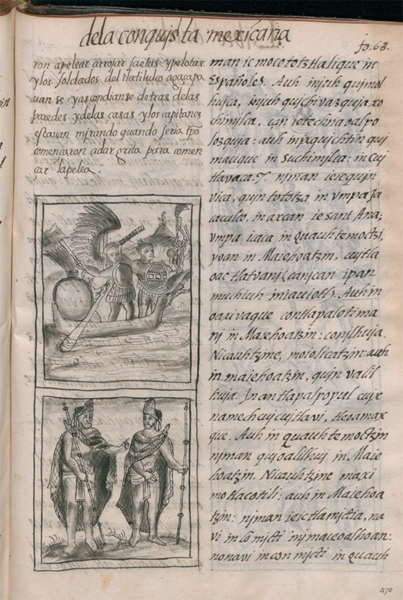 |
[Transcription of the Nahuatl (right-hand column) by James Lockhart:]
[f. 63r.] man ic mocototztlalique in Españoles.
Auh in iuh quimolhuica, in iuh quichivazquia xochimilca, çan ic technaoalpolozquia: auh in ixquichtin quimacique in suchimilca: in Cuitlavaca .&. niman ie ic quinvica, quintototza in vmpa Iacaculco, in axcan ie sant Ana; vmpa icaca in Quauhtemoctzi, yoan in Maiehoatzin, cuitlaoac tlatoani (ca nican ipan muchiuh in iauiotl).
Auh in oaxivaque contlapalotimani in Maiehoatzin: conilhuia. Nicauhtzine, moiolicatzin: auh in maiehoatzin, quinvalilhuia. In antlapalpopul cuix namechcuicuitlavi, tle oamaxque. Auh in quauhtemoctzin niman quioalilhui in Maiehoatzin. Nicauhtzine ma ximotlacotili:* auh in Maiehoatzin: niman ie ic tlamictia, navi in cōmicti in imaceoalhoan: no navi in conmicti in Quauh
----------
*MA XIMOTLACOTILI. The verb tlacoti 'to do work like that of a slave, to perform (humble) service', and the like, seems sometimes to have had the specific sense of performing rites and sacrifices.
|
[Translation of the Nahuatl (right-hand column) by James Lockhart:]
The Spaniards retired.
What the Xochimilco people had told themselves they would do was just to destroy us by stealth. And [the Mexica] hurriedly took all the people of Xochimilco, Cuitlahuac, etc., whom they had captured to Yacacolco, where [the church of] Santa Ana is now; there stood Quauhtemoctzin and Mayehuatzin, the ruler of Cuitlahuac (for he was here during the time that war was waged).
Those who had been captured greeted Mayehuatzin, saying to him, “Take it slowly, my lord.” But Mayehuatzin replied to them, “You wretches, did I invite you? What have you done?” Then Quauhtemoctzin said to Mayehuatzin, “My lord, please do your service.” Then he offered sacrifices, killing four of his subjects; Quauhtemoctzin also killed four.
[Translation of the Spanish (left-hand column) by James Lockhart:]
to fight, shooting crossbow bolts and musket balls. The soldiers of Tlatelolco crouched and hid themselves behind the walls and the houses; the captains, looking for when it would be time, began to call out for the battle to begin.
|
[Translation of the Nahuatl into Spanish by Fr. Bernardino de Sahagún; transcription of the Spanish (left-hand column) by James Lockhart:]
[f. 63r.] ron a pelear arrojar saetas y pelota: y los soldados del tlatilulco agaçapauanse y ascondianse detras de las paredes y de las casas y los capitanes estauan mirando quando seria tp̄o començaron a dar grita para començar la pelea.
|
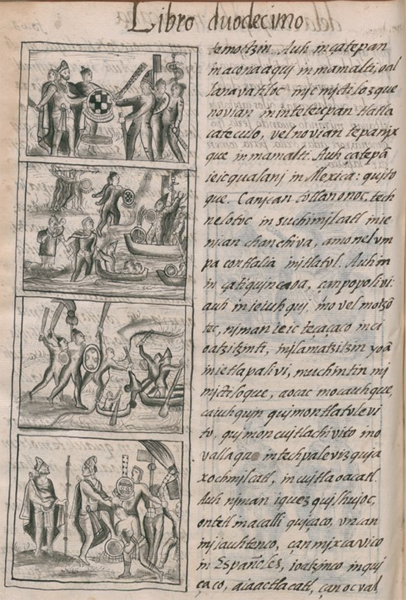 |
[Transcription of the Nahuatl (right-hand column) by James Lockhart:]
[f. 63v.] temoctzin. Auh in çatepan in ac onaaqui in mamalti, oallanavatiloc inic mictilozque novian in inteteupan tlatlacateculo, vel novian tepanixque in mamalti.
Auh çatepā ie ic qualani in Mexica: quitoque. Ca nican totlan onoc, technelotoc in suchimilcatl in ie nican chanchiva, amo nel vmpa contlalia in itlatol. Auh inin ça tiquincaoa, çan popolivi: auh in ie iuhqui, in o vel motzō tec, niman ie ic teçaçaco in cioatzitzinti, in ilamatzitzin yoā in ie tlapalivi, muchintin mimictiloque, aocac mocauhque, ca iuhquin quimontlatolevito, quimoncuitlachivito in ovallaque in techpalevizquia xochmilcatl, in cuitlaoacatl.
Auh niman iquezquilhuioc, ontetl in acalli quiçaco, vncan in iiauhtenco çan mixcavico in Españoles, ioatzinco in quiçaco, aiaac tlacatl, çan oc val
|
[Translation of the Nahuatl (right-hand column) by James Lockhart:]
Afterward it was ordered that whoever was included among the captives was to be killed in the temples of the demons all around; they all had an equal part in the captives.
Afterward the Mexica were angry over it all, saying, “The Xochimilco people live here among us, mixed with us, and make their homes here; are they not telling tales there [in Xochimilco]? Well then, we abandon them, they can just perish.” When this judgment had been made, the women, the old women included, and the able-bodied men were apprehended, and were all killed; not a one remained, because the people of Xochimilco and Cuitlahuac told false tales on them, and worked against them when they came saying they wanted to help us.
Then some days after that, two boats appeared at Iyauhtenco, with only Spaniards in it. It was very early morning when they appeared; there was no one else with them, they came by themselves.
[Translation of the Spanish (left-hand column) by James Lockhart:]
(intentionally blank)
|
[Translation of the Nahuatl into Spanish by Fr. Bernardino de Sahagún; transcription of the Spanish (left-hand column) by James Lockhart:]
[f. 63v., cuatro dibujos; sin texto en español]
|
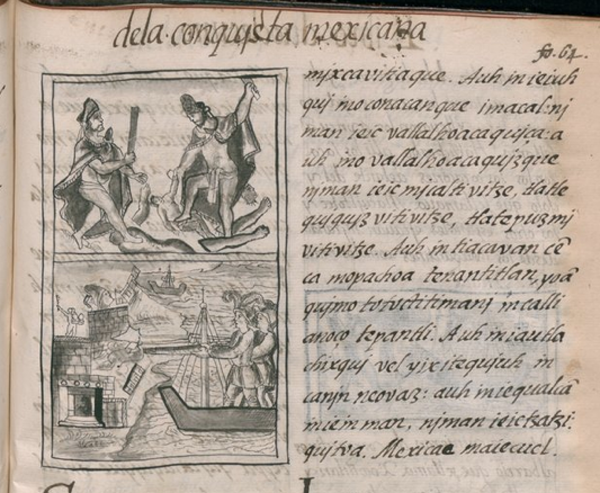 |
[Transcription of the Nahuatl (right-hand column) by James Lockhart:]
[f. 64r.] ]mixcavitiaque. Auh in ie iuhqui in oconacanque imacal: niman ie ic vallalhoacaquiça: auh in ovallalhoacaquizque niman ie ic micaltivitze, tlatlequiquizvitivitze, tlatepuzmivitivitze. Auh in tiacavan cēca mopachoa tenantitlan, yoā quimototoctitimani in calli anoço tepantli. Auh in iautlachixqui vel yix itequiuh in canin neovaz: auh in ie qualcā in ie inman, niman ie ic tzatzi: quitoa. Mexicae ma ie cuel.
|
[Translation of the Nahuatl (right-hand column) by James Lockhart:]
At this point they grounded their boats and came on dry land, and once on dry land they came skirmishing, shooting guns and iron bolts. And the warriors crouched very low at the walls, taking the houses or walls as shelter. And the sentinel kept his eyes peeled as to where they would rise up. And at the right moment, when it was time, he cried out, saying, “Oh Mexica, up and at them!”
[Translation of the Spanish (left-hand column) by James Lockhart:]
(intentionally blank)
|
[Translation of the Nahuatl into Spanish by Fr. Bernardino de Sahagún; transcription of the Spanish (left-hand column) by James Lockhart:]
[f. 64r., dos dibujos; sin texto en español]
|
